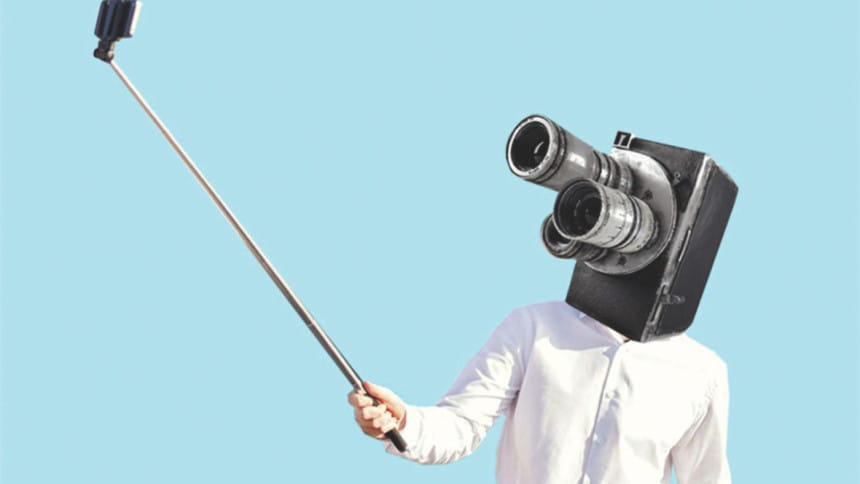'Likes' that can kill

Selfies were born when people found no one to take their photo. Again, no one among family and friends wanted to be left out, and so the crowding into the frame began. The fish-pout emanates from self-consciousness, and then mimicry. Phones got cheaper, the reversible camera was installed, apps arrived to share the shots with friends and others, a system of approval ('like') was invented, and an epidemic was born.
Selfies today are a big part of the internet-based public network, the growing web culture. While a great deal of the photography is of glee and gladness, anniversaries and moments of joy, alarmingly a good number of insensitive users chose to go overboard, much to their own peril – social, psychological and physical. It is the outcome of an urge to outdo one another; self-esteem and personal safety can go to hell.
People have taken selfies, smiling against a bellowing fire or a coffin at burial. Two girls, God knows why, took a selfie in a funeral home bathroom. Natural disaster victims became the background to 'sympathisers' with pouting lips. Animals have bitten selfie-masters at the right time in the wrong place. Doctors and nurses were selfied by a patient in labour. A girl was clinging on to the edge of a cliff and her friend did the selfie in full grin mode.
On occasions, the dignity of a person is at stake due to overindulgence on Facebook, WhatsApp, Instagram, Tumblr . . . Only last week, a woman was chatting on her mobile phone while travelling on the Kolkata-Delhi train. While still at it, she got up to go to the toilet and returned to her seat after finishing her job, unawares that she had left her pyjamas behind. To her, a greater incident would have been for the handset to have dropped in the loo.
Selfie-ness derives from loneliness and/or desperation for attention. With society suffering from both, a contraption at the end of a stretched-out arm and people huddling to get into the frame is now accepted as normal social etiquette.
Some selfies have remained the last before the unfortunate were struck by tragedy, self-inflicted if you will.
Twenty-one year old Oscar Otero Aguilar was "drinking and decided he wanted to make a new Facebook profile picture by taking a selfie with a gun to his head. The gun was loaded and went off, killing Oscar".
There is an element of craziness attached to this wave of common practice. "Two Iranian girls were taking a selfie video of themselves singing while driving. Luckily, when they did crash they weren't killed, just badly injured." But that did not deter them. "They also took a selfie on the way to the hospital."
Courtney Sanford was not that blessed. She "posted a selfie while driving and listening to the song "Happy" by Pharrel Williams. Seconds later her car crashed into a truck causing a fatal accident."
People can be stupid when it comes to impressing others on the social media. To some, it is an unsaid contest. Eighteen-year old Xenia Ignatyeva "climbed a 28-foot (8.4m) railroad bridge to take a selfie and lost her balance. When she fell she grabbed onto high voltage wires and was electrocuted."
Our youths, as well as adults if not to that extent, have been enamoured by this 'like' fad. Below I narrate a posting from one of my younger Facebook friends last week:
"This (10/6/2016) afternoon, a tragic incident took place in our Rampura WAPDA Road area. Some Class VIII students went to the rooftop of a six-storied building to shoot a video. The video was about them jumping from one rooftop to another, a 'sport' called parkour (which does not advocate unnecessary risk). They would post that video on Facebook to get maximum 'likes'.
"They did not understand how big a risk they were taking at such a tender age. While leaping from one roof to another, one of the boys fell down between two six-storied buildings. His friends were lost for words. The boy has broken bones. With severe head injuries he is now fighting for life at the Dhaka Medical College Hospital. The police have taken his friends into custody.
"Although this is a heart-rending incident, the social conditions of our youth are more frightening. Why should the 'like' madness affect Class VIII students, 12-13-year-olds, that they have to take the risk of falling from a six-storied roof? Bro, your life has not yet begun. Did you have to finish it so soon? Why do you have to become famous now by getting like after like? You are not yet in college, not yet a graduate, not yet employed, not married, [have] not yet served your parents. There is so much to do, so much to see in life.
"If you have to be famous, succeed in life. Then you[r] one post will get one thousand likes. Your writing, your picture, will then not only be seen by boys and girls of your class and school, but by the entire country. Don't strive to become a so-called 'Facebook Celebrity'.
"Guardians too have to be aware. At what age are we giving our children a smart phone? Why? What are they doing [with] it? Do they know about the dark aspects? We have to think."
Let us not yearn for the approval of another, especially not in a manner that can endanger or jeopardise life.
The writer is a practising Architect at BashaBari Ltd., a Commonwealth Scholar and a Fellow, a Baden-Powell Fellow Scout Leader, and a Major Donor Rotarian.

 For all latest news, follow The Daily Star's Google News channel.
For all latest news, follow The Daily Star's Google News channel. 




Comments